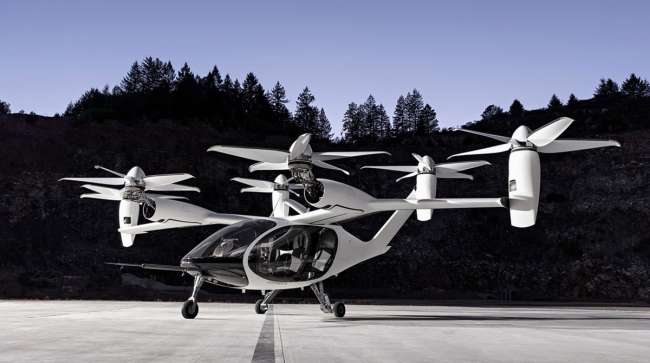Bloomberg News
Uber-Backed Joby Aviation Goes Public; Share Price Slides

[Stay on top of transportation news: Get TTNews in your inbox.]
Joby Aviation, which promises to build and operate a commercial fleet of aerial taxis by 2024, began trading Aug. 11 on the New York Stock Exchange, testing the imaginations of public investors.
Since its listing, the Joby Aviation share price has fallen 30.7% from $13.40 on Aug. 11 to $9.29 on Aug. 17.
Founded in 2009, Joby has sold the likes of Uber Technologies Inc. and Toyota Motor Corp. on its plan to build a new kind of passenger drone and has raised more than $700 million in private capital. A merger this week with a special purpose acquisition company will bring in more than double that amount.
Joby is the biggest among a group of upstarts, which also includes Volocopter GmbH and Beta Technologies Inc. They’re going up against Airbus SE, Boeing Co. and Lockheed Martin Corp. by seeking to leverage breakthroughs in battery technology to create a more environmentally friendly form of urban transportation free from earthbound traffic. To succeed in bringing science fiction to life, they need to mass-produce the machines, surmount regulatory hurdles and make the business model work.
The rise of SPACs since last year has enabled a new breed of stock to list on the world’s most elite exchanges. The process allows companies, some with no revenue whatsoever, to bypass the scrutiny associated with an initial public offering and raise capital from investors who signed a blank check. Aerospace companies have been an especially eager adopter of the model.
We have been working for over a decade to get our technology ready for market and are excited to take this moment to celebrate our achievements so far. #nyse #experiencesquare #eVTOL @NYSE pic.twitter.com/XlpxXiA1Pa — Joby Aviation (@jobyaviation) August 11, 2021
Joby will get $1.6 billion in new financing through the merger with a SPAC called Reinvent Technology Partners. The shares trade on the NYSE under the ticker symbol JOBY.
In anticipation of the deal, Joby accelerated hiring and now employs more than 800. It demonstrated what it calls a final aircraft design to two Bloomberg reporters in June and said it will begin manufacturing the vehicles next year. Last month, Joby said it completed a flight of more than 150 miles on a single charge. The company has been working for several years with the Federal Aviation Administration and expects to achieve certification in 2023. As it works toward that goal, it will begin training pilots to operate the five-seat crafts.
A great deal of hype surrounds flying cars. Morgan Stanley has estimated that the market for electric vertical mobility will be worth $1 trillion by 2040. But a regulatory green light is far from assured, said Robin Riedel, a McKinsey & Co. partner who leads the firm’s aerospace practice. First-time approval from the FAA for novel aircraft can face delays of a year or more, he said. “Every certification is a risk until someone has actually done it,” he said. “The devil is in the details.”
Finding places from which to take off and land is another necessary piece of the puzzle. Joby struck a deal this year with SoftBank-backed Reef Technology Inc. and Neighborhood Property Group to gain access to the rooftops of some parking garages and other buildings in North America and Europe. Joby expects to install helipad and charging stations at those sites.
Joby plans to develop a taxi service through partnerships. Uber, which is both a major investor and partner after selling its own flying car unit to Joby late last year, has said it will offer Joby’s air service to its customers and provide ground transportation to Joby departure and arrival sites. They plan to start in U.S. cities, including Los Angeles, Miami, New York and San Francisco.
Want more news? Listen to today's daily briefing below or go here for more info:

